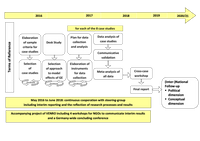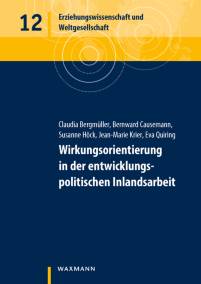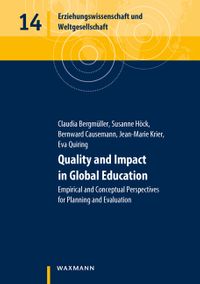Background
For several years now, the demand for increased impact orientation has also affected the field of development education and awareness raising. The implementation of this demand is not a trivial matter, because learning processes are in the foreground here, and these processes are dependent on many influences and thus elude classic causal-analytical evaluation designs. Thus for some time now, there has been discussion regarding what can be considered an “impact” in development education and awareness raising and how these impacts can be identified. Both questions are dealt with within the scope of the research project “Impacts and methods of impact monitoring in development education and awareness raising”, which is to be presented in this volume. This research project was financed by the German Federal Ministry for Economic Cooperation and Development. Against the backdrop of the empirical findings, this publication shows which effects can be targeted in the planning of development education projects and which contextual conditions can influence their effectiveness.
Team
Claudia Bergmüller, Dr. phil., is a professor of educational science with a fo- cus on school theory/historical educational research at the University of Edu- cation Weingarten. Her main areas of work include education for sustainable development/Global Learning, evaluation research and school and lesson de- velopment. She has been coordinating the “Evaluation of Development Educa- tion” network since 2007 and advises non-governmental and funding organi- sations on the impact-oriented evaluation of educational projects.
Bernward Causemann is an independent consultant in the field of develop- ment cooperation and is associated with the company FAKT GmbH. He pro- vides advice, evaluation and training in developmental work in Germany and abroad. His main areas of focus include methods of impact assessment and systematic evaluation approaches.
Susanne Höck, M.A., Dipl. Development Policy/Economics (UK), has been evaluating, in particular, projects in the areas of development education, Glob- al Learning and ESD since the foundation of EOP in 2002 (www.eop-evalua- tion.de). She provides support for self-evaluations and organisational develop- ment and also works as a trainer.
Jean-Marie Krier, Dr., educational scientist/sociologist (Univ.), business ad- ministration graduate (Univ.), is a member of the KommEnt GmbH team in Salzburg, Austria. He has been evaluating and providing advice for many years in the areas of development education, Global Learning and fair trade in Germany and abroad.
Eva Quiring, Dipl. cultural and business studies graduate (Univ.), M. Eval. (Univ.), is the managing director at EQ EvaluationsGmbH (www.eq-eval.de). She has worked as a freelance project expert for the development education funding programme, and now provides her services as an independent evalu- ator and trainer in Germany and abroad.
Organisational structure of the study
Presentations of the study


